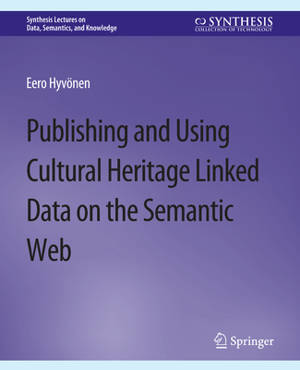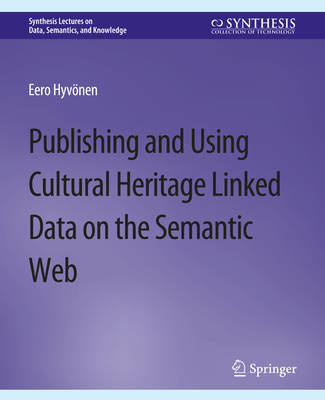
- Afhalen na 1 uur in een winkel met voorraad
- Gratis thuislevering in België vanaf € 30
- Ruim aanbod met 7 miljoen producten
- Afhalen na 1 uur in een winkel met voorraad
- Gratis thuislevering in België vanaf € 30
- Ruim aanbod met 7 miljoen producten
Zoeken
Publishing and Using Cultural Heritage Linked Data on the Semantic Web
Eero Hyvonen
€ 34,95
+ 69 punten
Uitvoering
Omschrijving
Cultural Heritage (CH) data is syntactically and semantically heterogeneous, multilingual, semantically rich, and highly interlinked. It is produced in a distributed, open fashion by museums, libraries, archives, and media organizations, as well as individual persons. Managing publication of such richness and variety of content on the Web, and at the same time supporting distributed, interoperable content creation processes, poses challenges where traditional publication approaches need to be re-thought. Application of the principles and technologies of Linked Data and the Semantic Web is a new, promising approach to address these problems. This development is leading to the creation of large national and international CH portals, such as Europeana, to large open data repositories, such as the Linked Open Data Cloud, and massive publications of linked library data in the U.S., Europe, and Asia. Cultural Heritage has become one of the most successful application domains of Linked Data and Semantic Web technologies. This book gives an overview on why, when, and how Linked (Open) Data and Semantic Web technologies can be employed in practice in publishing CH collections and other content on the Web. The text first motivates and presents a general semantic portal model and publishing framework as a solution approach to distributed semantic content creation, based on an ontology infrastructure. On the Semantic Web, such an infrastructure includes shared metadata models, ontologies, and logical reasoning, and is supported by shared ontology and other Web services alleviating the use of the new technology and linked data in legacy cataloging systems. The goal of all this is to provide layman users and researchers with new, more intelligent and usable Web applications that can be utilized by other Web applications, too, via well-defined Application Programming Interfaces (API). At the same time, it is possible to provide publishing organizations with more cost-efficient solutions for content creation and publication. This book is targeted to computer scientists, museum curators, librarians, archivists, and other CH professionals interested in Linked Data and CH applications on the Semantic Web. The text is focused on practice and applications, making it suitable to students, researchers, and practitioners developing Web services and applications of CH, as well as to CH managers willing to understand the technical issues and challenges involved in linked data publication. Table of Contents: Cultural Heritage on the Semantic Web / Portal Model for Collaborative CH Publishing / Requirements for Publishing Linked Data / Metadata Schemas / Domain Vocabularies and Ontologies / Logic Rules for Cultural Heritage / Cultural Content Creation / Semantic Services for Human and Machine Users / Conclusions
Specificaties
Betrokkenen
- Auteur(s):
- Uitgeverij:
Inhoud
- Aantal bladzijden:
- 145
- Taal:
- Engels
- Reeks:
Eigenschappen
- Productcode (EAN):
- 9783031794377
- Verschijningsdatum:
- 19/10/2012
- Uitvoering:
- Paperback
- Formaat:
- Trade paperback (VS)
- Afmetingen:
- 191 mm x 235 mm
- Gewicht:
- 314 g

Alleen bij Standaard Boekhandel
+ 69 punten op je klantenkaart van Standaard Boekhandel
Beoordelingen
We publiceren alleen reviews die voldoen aan de voorwaarden voor reviews. Bekijk onze voorwaarden voor reviews.











